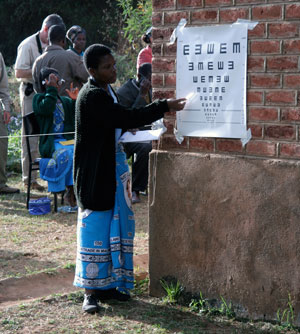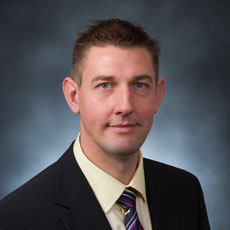Our Mission
More than 2 billion people lack the glasses they need to see clearly.
The developing world cannot yet support the conventional optical industry's business model: a highly trained eye care professional who uses expensive equipment to find a customer's prescription, who selects from dozens of different strength lenses to make a custom pair of glasses, and who sells the final product to the customer for a large profit margin.CVDW develops scalable, sustainable solutions based on Joshua Silver's pioneering work on self-refraction using adaptive spectacles: a single product that can be adjusted by the wearer following simple instructions to give high quality vision correction at low cost. Self-refraction supports a business model or humanitarian or government distribution model that relies on the simplest possible logistics and minimal technical skill, enabling entrepreneurs, humanitarian organisations and governments to develop marketing and distribution strategies that fit the local social and economic context.
CVDW supports the self-refraction approach as an open platform, serving the community by bringing together research and practical advice; by supplying a range of low cost, high quality self-refraction products; and by providing a forum for entrepreneurs and humanitarian organisations to exchange their experiences and develop a set of effective practices in diverse local environments. We collaborate with other organisations to pilot scalable, sustainable distribution models, and we connect promising projects with funding and other support.
Professor Joshua Silver
Director
James Stephenson
Board Member
James Stephenson is the global strategic marketing manager for Dow Corning Corporation's Healthcare business, and is a member of the Centre's Board of Directors. James joined the Centre at the start of our Child ViSion™ collaboration with Dow Corning in late 2010.
James Stephenson joined Dow Corning in 1997 as a manufacturing engineer at the Barry site in the United Kingdom. Through a variety of commercial roles, James has built more than a decade of experience in business development and commercial leadership. Based at Dow Corning's global headquarters in Midland, Michigan since 2006, James has taken leadership roles in a number of groups, including the Advanced Technologies and Ventures business, the Business and Technology Incubator and most recently in his role in Healthcare. James holds a M.Eng in Chemical Engineering from Swansea University and an MBA from Manchester Business School. He is also a Chartered Engineer (C.Eng) and a member of the Institution of Chemical Engineers (MIChemE).
In joining the Centre, James has brought his considerable commercial knowledge and experience, as well as a keen interest and understanding in the area of sustainable development.
Dr David Crosby
Visiting Fellow
Based on his research experience with optics and motivated by a desire to tackle practical problems of real world importance, David helped set up the Centre with Professor Silver in 2009. His current research interests cover the range of activities of the Centre, but in particular David is interested in the creation and use of new technology and techniques in order to help provide effective, low cost eye-care to the world.
Dr Amitava Gupta
Visiting Fellow
Since leaving JPL in 1987, Dr Gupta has successfully led a wide variety of projects in companies ranging in size from startups to large corporations. His work has encompassed many areas of vision correction technology, including intraocular lenses, developing biocompatible materials, contact lenses, multifocals and most recently variable power lenses. Dr Gupta brings a wealth of technical and management experience to the Centre, providing advice on ophthalmic science and technology.
Professor Bruce Moore
Visiting Fellow
Dr Moore is active in efforts to design effective vision screening programs for infants and young children. He has also been intimately involved in efforts to develop programs for vision care for young children. He is a principal investigator in a National Eye Institute funded study of vision screening of children which aims to develop vision screening procedures that are applicable to broad use in the preschool population. His text, Eye Care for Infants & Young Children, published in 1997, became the standard textbook in pediatric optometry for students and practitioners.
Another major research and policy interest of Dr Moore concerns eyecare for the developing world. By joining the Centre as a visiting fellow, Dr Moore brings his considerable expertise and knowledge to help us tackle this major issue.
Chris Wray
Director
Chris advised on all aspects of establishing the Centre for Vision in the Developing World and he now leads distribution projects.
Mehdi Douali
Senior Adviser
Mehdi has advised Professor Silver on strategy and fund raising and maintains an interest in vision science research.








